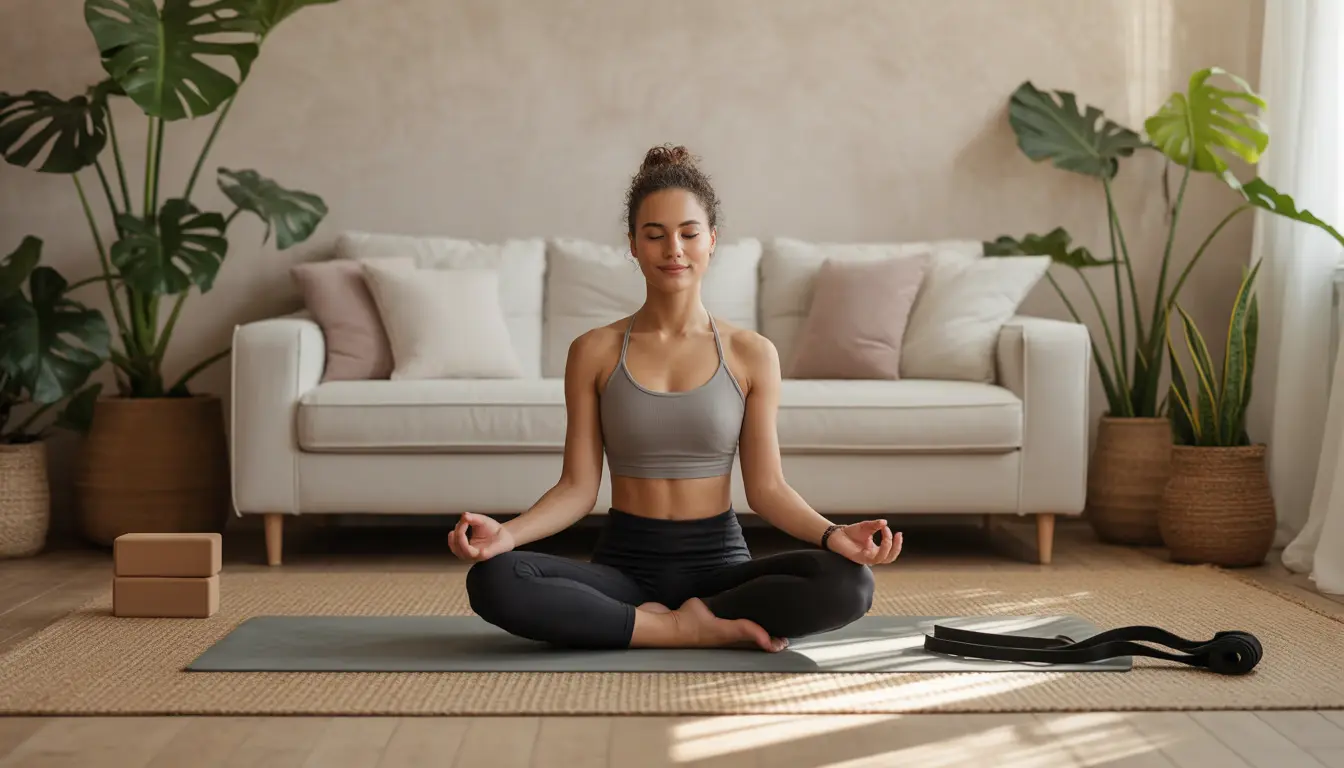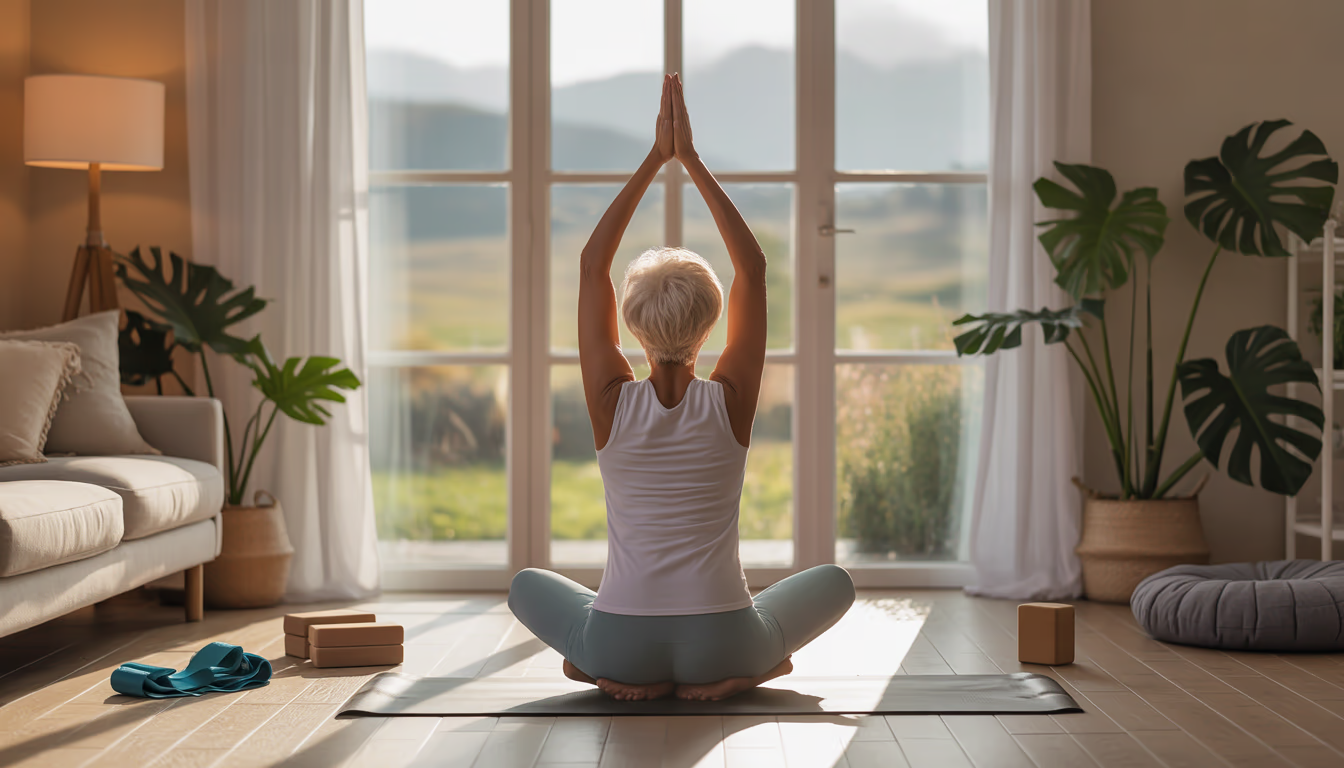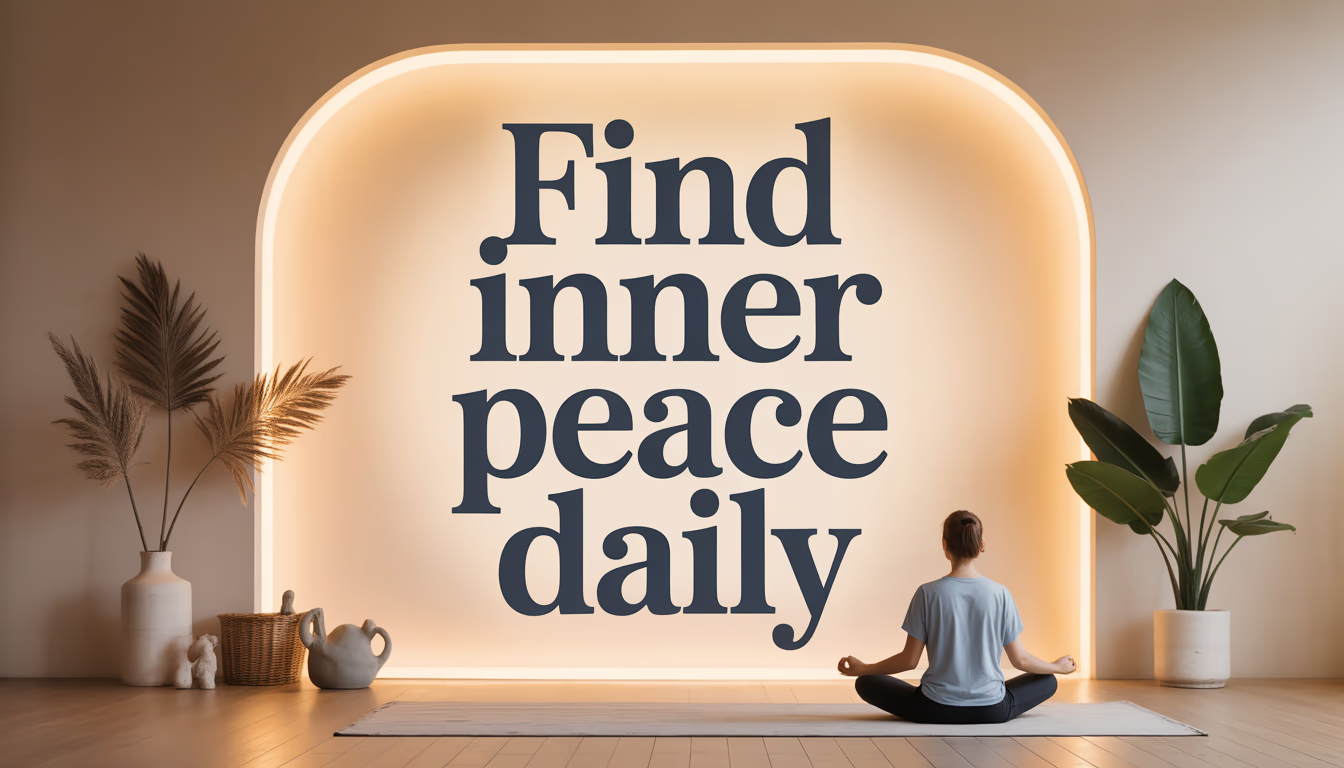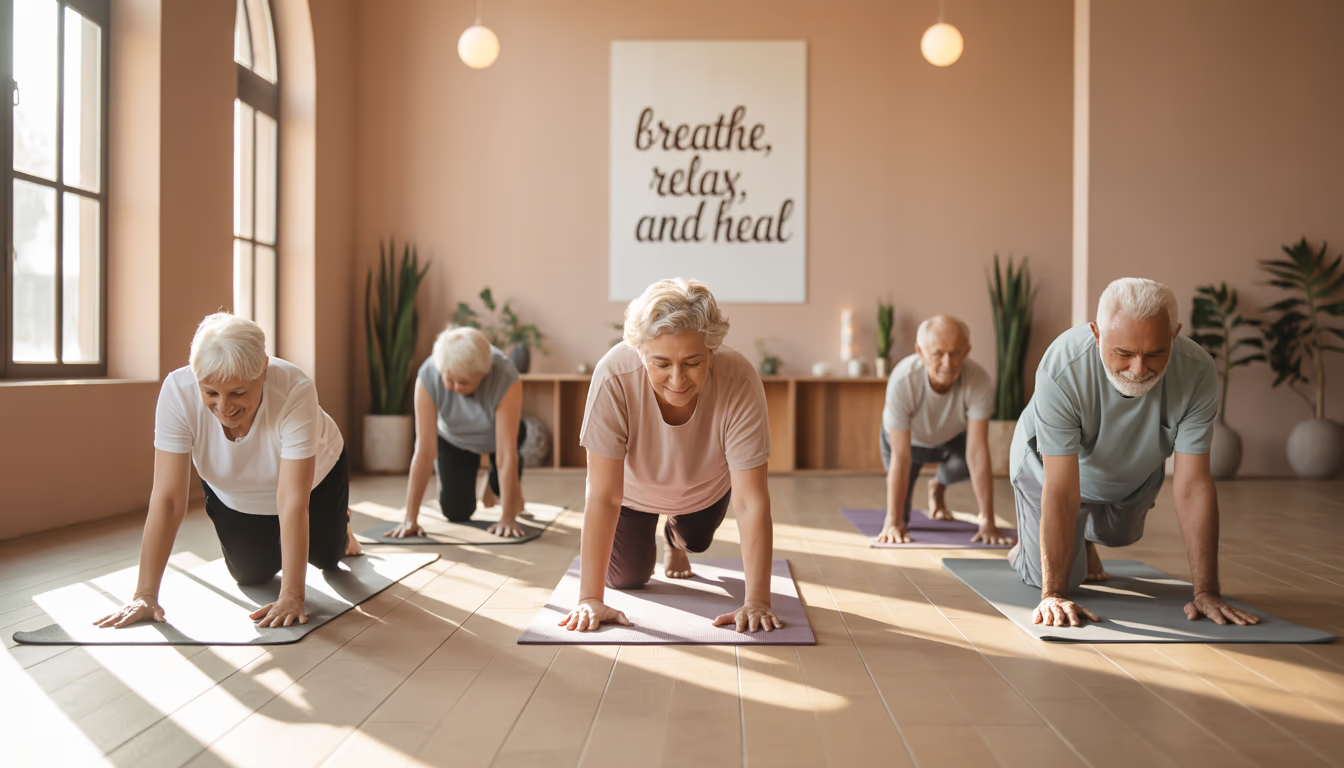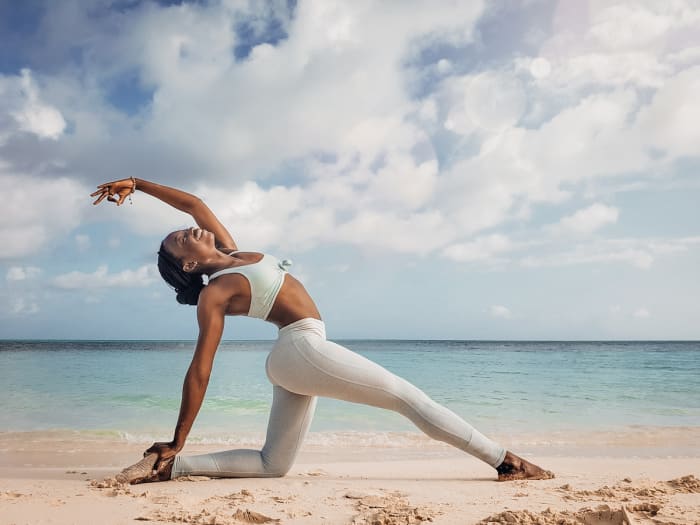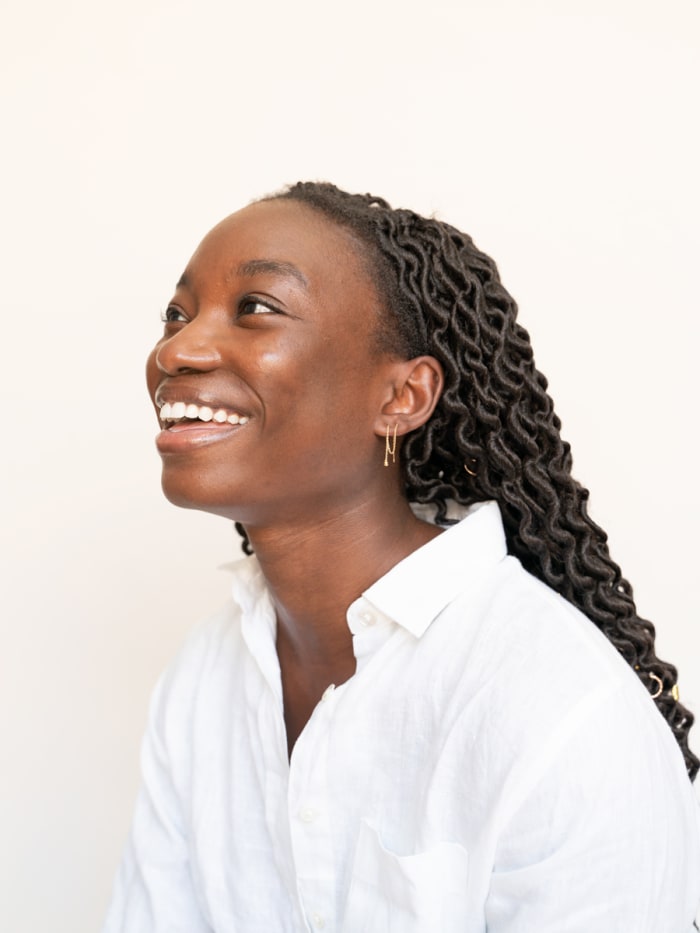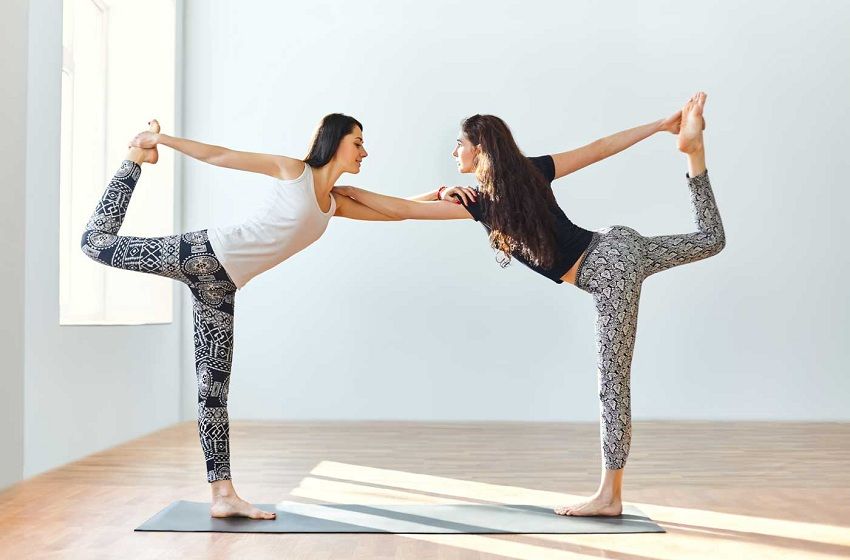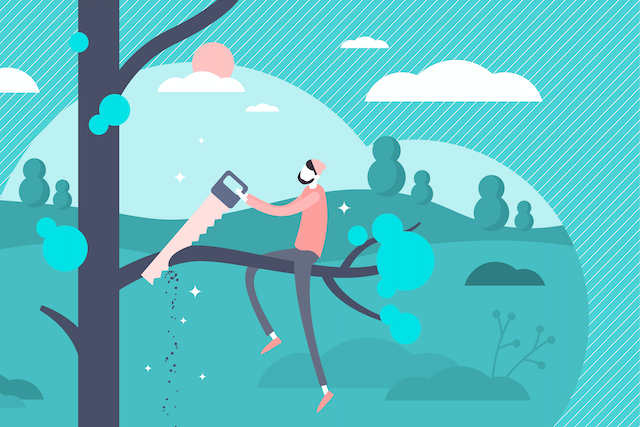Mia Caine is a wellness blogger who’s created a brand that stands for the values she believes in: integrity, inclusion, and self-care. Known by her community as The Healthlete, Caine’s passion for health and wellness is inspired, in part, by an earlier athletic career as a track star in one of the toughest races in the sport: the 400 meters.
Caine spent most of her young adult life training and competing at her high school in Boone, North Carolina, nestled in the heart of the Appalachian Mountains. She always imagined there was more to life than this homogenous small town, and dreamed of moving to New York City. She was accepted to Columbia on a full scholarship and says she became the only student at her school at the time to attend an Ivy League university.
During the summer that followed her sophomore year, Caine traveled to Nigeria for the Olympic trials for a shot on the Liberian team, where her family of origin is from. She and her 4x4 relay squad missed their chance by a tenth of a second, which, after 16 years of running and competing, marked a turning point; it was time to try something else. After being told all her life what to do by coaches, Caine found herself wondering what other people did for fitness. She joined ClassPass, and entered her junior year with an open mind. She tried it all, from Pilates to cycling to yoga, which appealed to her in a holistic way that other forms of exercise had not.
See also What Most People Get Wrong About Self-Care
After graduating with a degree in political science and sustainable development, Caine worked briefly as a brand-to-brand strategist for an agency in Manhattan before she set out to work for herself. She aligned her yoga practice with a desire to start her own health and wellness blog, and has found that her studies from college inform the work she’s doing today. Caine splits her time between New York City and Miami, and recently launched Shop Wellthy, a conflict-free minimalist jewelry line she designs herself using sustainable materials. During the COVID-19 pandemic, Shop Wellthy is donating 100 percent of the profits to the consumer’s charity of choice. “I’m doing my part to move the Earth forward in a sustainable direction,” Caine said.
Yoga Journal caught up with Caine to learn more about The Healthlete’s philosophy and discuss inclusive wellness and the problematic and illusory nature of optical allyship on social media.
This conversation has been edited and condensed for clarity and length.
YJ: What does conscious and inclusive wellness mean to you?
Mia Caine: Wellness shouldn’t look one way. What I do in my day-to-day that makes me feel healthy and well is my choice. For each of us, the things we do to put our best foot forward are different. So much of wellness is based on what you need to buy: a $200 product or a $20 green juice. Wellness is centered on those with privilege and a certain amount of expendable income who can afford to spend the money to be well. But wellness can come from the small habits in your everyday life that can influence the rest of your life; the little things like meditating. I write in a journal every morning and night, and that's really helped my goal setting and keeping up with my intentions. There are just so many ways to be well beyond buying product after product. When I started blogging, I felt this pressure to go to all these boutique fitness places; that I needed to be wearing a certain type of athleisure wear. But when you do the math and add up the dollars it just doesn't make sense. Financial health is an important part of living a healthy life, and it’s unnecessary to spend all this money just for the appearance of being healthy and well. You can’t put a price tag on real wellness.
See also The Time to Rest is Now
Is part of your work to remedy wellness’s exclusivity problem?
I recognize that the industry isn't as inclusive as it represents itself. Wellness brands and companies need to understand that there is no formula for trendy buzzwords or tokenizing of BIPOC images to appear inclusive. Much of their audiences are savvy and can see straight through that performative allyship. Real inclusivity is about breaking stereotypes, amplifying minority voices that already exist within their niche, valuing the work of those same voices equally, developing a brand voice that is not afraid to speak out on humanitarian issues, and then aligning with those values by ensuring that they’re shared within the workplace and with their consumers. By doing these (and more), inclusivity stops being a conversation and starts happening in real life. As someone who blogs and gets reached out to by brands every single day, I've had to really dig deep and recognize that while it's great to have all these partnerships, I have to make sure that what I'm putting out there for my audience is in alignment with my message [of saying No to brands that aren't aligned with the message of inclusivity that I'm putting out there. I won’t partner with someone who has a product at a price point that is only realistic for a small percentage of people. I'd be doing my audience a disservice by telling them that a product like that is necessary.
What practices have you leaned on during these times of uncertainty and upheaval to steady yourself and stay motivated?
It's OK to slow down. There's this sense of urgency all the time, but not every single thing is of the utmost importance all the time. Time is a construct—if we can't get it all done today, it'll be OK. Instead of trying to do everything all at once I’ve tried to schedule things so that I can focus on one thing at a time. I also make time to breathe, and I meditate almost daily. But I don't put the expectation on myself that I have to every single day. So it's OK to skip a day, a few days, whatever it may be. But meditation is really a key part of it—it's a nice way to wake up, tune in, and focus on my breath—and just celebrate that I am alive to see another day. After about five to ten minutes of meditation, I write down in my journal three things that I'm grateful for, three things I can do today that can further my goals, and how I can make someone's day better. Recognizing that there's a lot for me to be grateful for, and that I can continue to do the work that I do from a grateful heart but still meet my goals, helps keep me in a positive mindset.
See also 18 Reasons to Practice Self-Care
Is this inner work an integral part of the anti-racist work that’s needed now?
Definitely. There's just so much going on in the news—every single day I see another name added to the list. I need to stay centered while I’m also trying to do as much as I can to help, whether it's donating, signing petitions, sharing information on my social media, or having conversations with the people in my life. It’s hard not to get emotional about this stuff because it just keeps happening. As a Black woman, I have had my own disadvantages, but at the same time, some of my struggles have afforded me some privileges. Could I turn away and say that I just can't handle it? Yes, I could, but I don't, because I recognize that there are so many people who can't, and I need to stand up for those people, too. I need to do whatever I can to amplify their voices to support this movement, to make sure that more people can live their lives the way that I do now—and not live in a place where they experience fear on a daily basis. I just learned of Elijah McClain’s story; he was put in a chokehold by police in August 2019. There are so many stories like these that we never heard about that just swept under the rug; that are treated as normal and acceptable. It just frustrates me so much. But even as an entrepreneur in the wellness space with an Ivy League education who has experienced many great things in life, there's no amount of acceptable blackness that protects me from this. These are not isolated incidents that only happened in certain places—it can happen anywhere.
There's so much sadness, uncertainty, anger, frustration, and grief in the collective psyche right now. What advice do you have for those who are struggling with their emotions?
While it's important to show up as much as we can to keep moving this cause forward and keep fighting for justice and equality, it's OK to take care of yourself. If your cup is empty it helps no one; you need to take time for self-care and healing. It's also important to not just protest or donate, but to have conversations with the people around you. I really encourage everyone to not only discuss how all of this has disproportionately affected Black people—especially police violence and systemic oppression—but also to talk about white privilege. I know that it's a hard topic for some people and that the concept of privilege is uncomfortable. But privilege manifests in both small and big ways. To understand white privilege is to really think and reflect on the ways in which your white privilege might have helped you or might have put someone else down. When people start to look at their own life and try to understand the moments in which they’ve experienced white privilege, it helps them to notice when it happens in the future, like, wow, I see something really wrong happening here. That’s your moment to speak up. That’s your moment to be of service and actually stand up in the face of injustice—and not just post something on social media, which is just optical allyship since you're already in solidarity among like-minded followers. Whether you’re walking down the street, sitting at your desk at work, or headed to the grocery store—it’s those real-life moments happening right in front of you and how you respond to them that really matter. Social media is not the only world in which you can make a difference.
See also Why Every Yoga Teacher & Practitioner Needs Inclusivity Training

